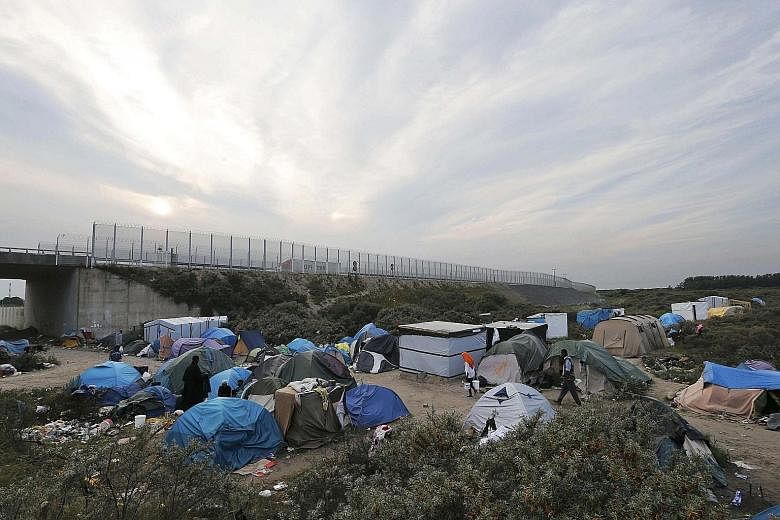CALAIS • France and Britain yesterday announced a new "command and control centre" to tackle smuggling gangs in Calais, as Europe grapples with its biggest migration crisis since World War II.
Under a deal signed by British Home Secretary Theresa May and her French counterpart Bernard Cazeneuve, British teams will be deployed to bust smuggling gangs and reduce nightly attempts by desperate migrants and refugees to break into the Channel Tunnel.
The deal includes extra French policing units, additional freight searches and tighter security at the entrance to the Channel Tunnel near Calais through more fencing, cameras, floodlighting and infrared detection technology.
Also, a control centre will be built at the French port city to try and bring down entry attempts, which at the start of the summer numbered up to 2,000 a night, but have since been reduced due to tighter security.
Under the agreement, Britain will also provide €10 million (S$15.6 million) over two years to speed up asylum applications and boost humanitarian aid in Calais.
Speaking at the entrance of the Channel Tunnel, Mr Cazeneuve praised "the excellent cooperation between British and French authorities", which has helped bring down entry attempts.
Some 3,000 people from Africa, the Middle East and Asia are camped out in Calais, and at least nine have died trying to cross over into Britain, where many have family and work is believed to be easier to find.
These numbers are a tiny fraction of those entering other European countries, particularly Germany, which has said it expects a new record 800,000 asylum seekers this year - far more than the 500,000 initially expected.
Mr Cazeneuve travelled to Germany yesterday evening to discuss the issue, which Chancellor Angela Merkel has warned could become a bigger challenge for the European Union than the Greek debt crisis.
EU border agency Frontex on Tuesday reported a record high of 107,500 migrants at the borders last month. And the number of migrants arriving in debt-crippled Greece is accelerating dramatically, with nearly 21,000 landing on the overstretched Greek islands last week, the United Nations said.
British politician Keith Vaz, who chairs a body overseeing Ms May's ministry, welcomed yesterday's deal but warned there was evidence of greater "illegal activity" at other Channel ports in France, Belgium and the Netherlands. "Closing off one route will only mean the problem moves to another port," he said.
Tighter security has pushed up prices for migrants and refugees paying smuggling gangs to sneak them across. "Getting into a lorry cost €500 just a few months ago, now it's €800-€900 because there are so many more police and sniffer dogs," said Mr Francois Guennoc, who works for a non-governmental organisation.
The EU has so far approved €2.4 billion of funding to help member states cope with the flood of migrants. But Mr Elhadj As Sy, head of the International Federation of Red Cross and Red Crescent Societies, insisted the response so far "is nowhere near the scale of the problems that we are seeing".
He believes the only way to stop the traffickers is to increase legal means of migration.
AGENCE FRANCE-PRESSE

